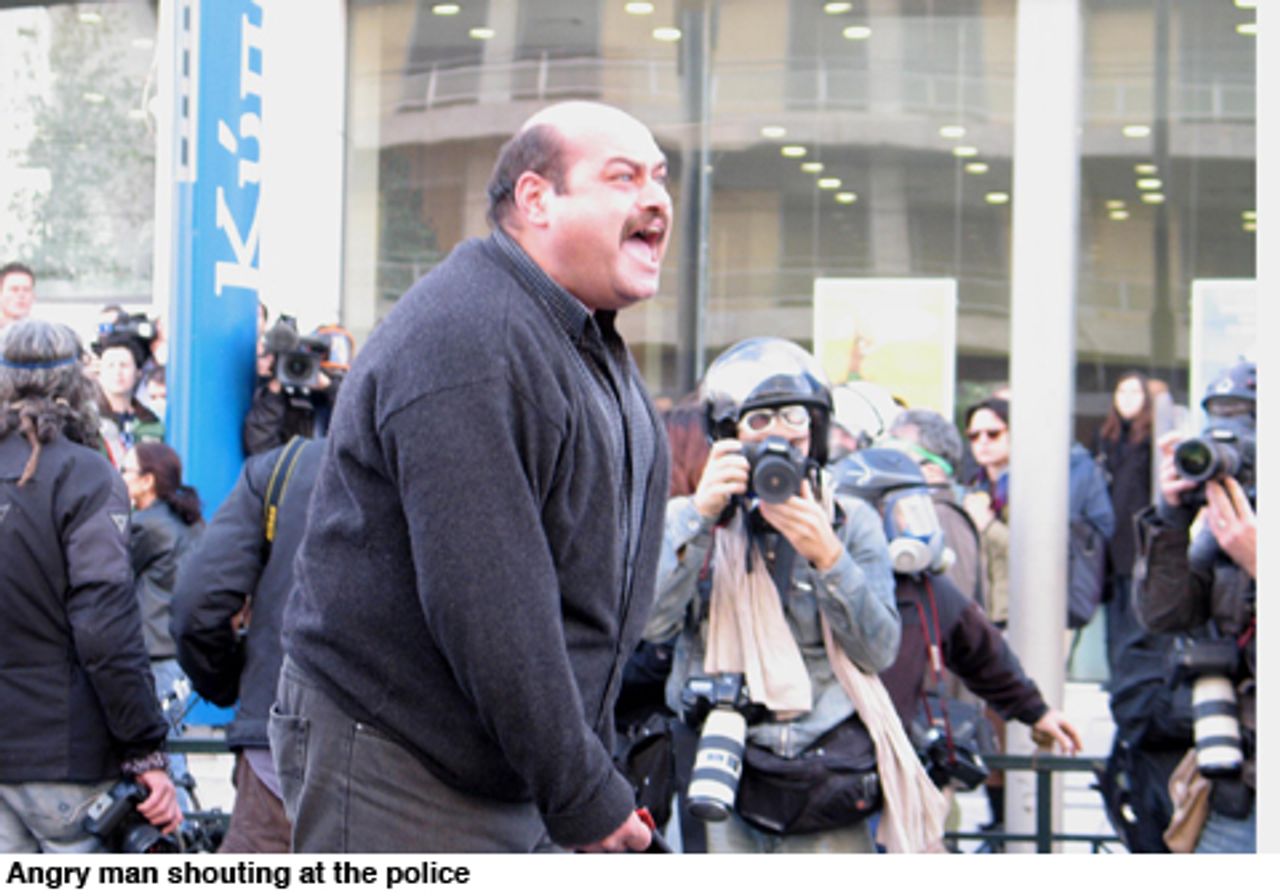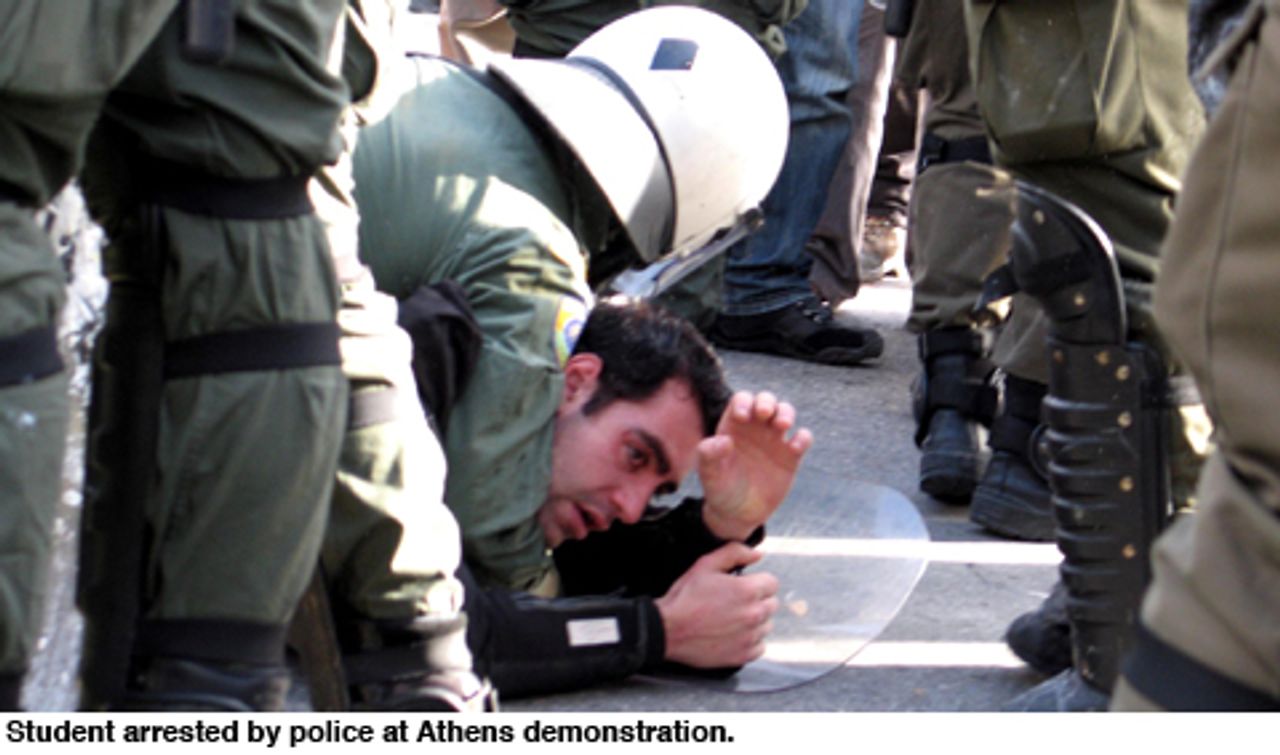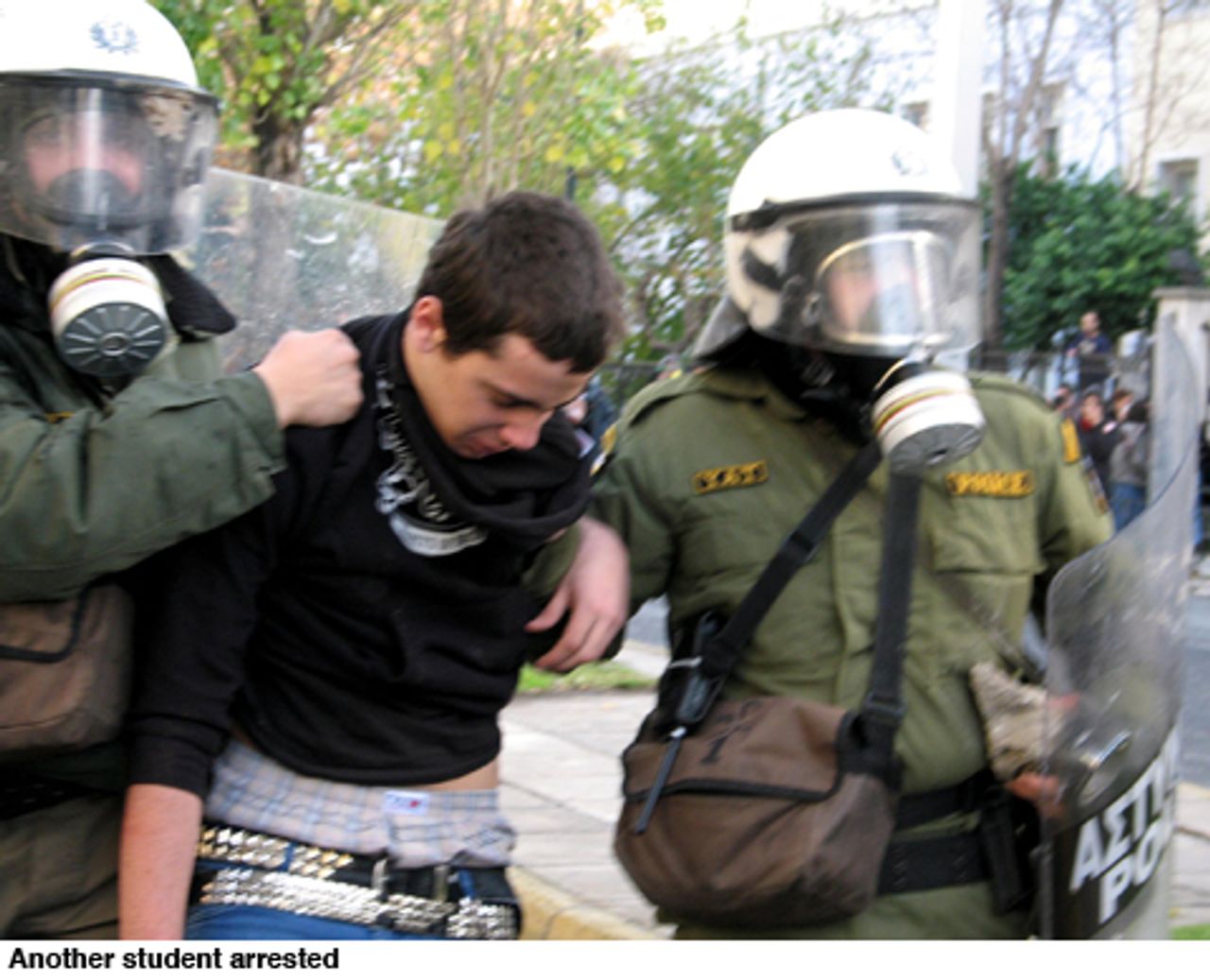Protests and demonstrations are continuing in Greece in the wake of the killing of 15-year-old Alexis Grigoropoulos. Coordinating groups organised renewed protests on Wednesday and Thursday in Athens and Thessaloniki. A number of University and Technical College departments as well as high schools and lyceums remain under occupation. Incidents were reported this week outside the Court House in Thessaloniki following a verdict—suspended prison sentences—for eight policemen charged with viciously beating a Cypriot student in November 2006.
On Wednesday, protesters also draped two huge banners over the walls of the Acropolis. The initiative was aimed at rallying support in other European countries. One banner bore the word “Resistance” written in Greek, English, Italian and German, and a second called for “Demonstrations in all Europe.”
In a new development, around 40 people—including workers, immigrants and the unemployed—occupied the offices of the country’s main labour union GSEE to protest the union's pro-government orientation. The union’s president criticised the protest. “The GSEE does not govern this country,” said GSEE leader Yiannis Panagopoulos.
More protest demonstrations took place in central Athens on Thursday. The trade unions and the Stalinist Communist Party of Greece (KKE) organised their own rally independent of the student and school pupils mobilisation. Ten thousand took part in the main demonstration, which proceeded from university grounds and marched on the Greek parliament. As the march arrived, there were renewed violent clashes between angry protesters and large numbers of paramilitary police.
All flights to and from Athens airport were halted for several hours on Thursday as air traffic controllers protested against government policies and demanded a pay rise.
We include below a report sent from a student in Athens who participated in a demonstration on Monday.
On Monday, December 15, 2,000 to 3,000 students gathered at noon outside the general police station of Attica (the Greek subdivision containing Athens) to conduct a peaceful protest following the death of Alexandros Grigoropoulos and to raise their demands for a better educational system.
Most of the students sat down on Alexandras Avenue, where the police station is situated, and protested entirely peacefully. Some of them even offered the police officers flowers. The atmosphere grew tense, however, when a large contingent of police special forces (in green uniforms) started gathering around the police building in order to “protect” it.
Some students responded by throwing oranges at the police, who proceeded to force the protestors to back up. The protestors formed their own defensive line to guard against an attack from the police forces, who were armed with clubs and gas spray. At that very moment of tension, a middle-aged man took position directly between the students and the police (see photo). He began shouting to the officers: “You should be ashamed carrying the Greek flag on your heads [i.e., on their police helmets], you make me ashamed to be a Greek citizen with your actions. They are only kids. You are destroying their innocence with your brutality.” He then left to the applause of those gathered. Initially, the police didn’t react, but some time later, they conducted raids into the crowd, using tear gas in an attempt to arrest some students.

The police aggression angered demonstrators, and some began throwing stones at the police lines. More and more police officers arrived, and their assembled ranks resembled an army. Once again, the police drove forward into the crowd to make arrests. This time it worked.

One of the students was arrested and beaten up. A number of citizens and students tried to rescue him from the police. However, the police began spraying with tear gas anyone who approached. Some protesters set fire to trash cans. The police reacted immediately and made a last attack to arrest as many as they could. Unfortunately, they arrested a young teenager who didn’t really realise what was happening. After the arrests, the gas attacks, and the threats by police, most of the students proceeded to the Medical University.

On the way to the Medical University, we passed some hospitals. A number of doctors came out to declare their support for us, and that they regarded the mass movement as a fight for a better democracy. At the hospital entrance there was a sign saying, “No to the privatisation of the welfare system; no to the privatisation of the hospitals; more doctors in the hospitals, better salaries.”
The decay of the health system in Greece is a huge issue. There are too few doctors, who are badly paid and work in very old hospitals. These are reasons for the corruption of the system, with some doctors asking for bribes from patients.
It was noticeable that most of the police officers are very young people like us. This made me feel ill because, under different circumstances, they could be my friends or classmates. At the same time, it was clear that the secret police agents had infiltrated the students’ protest, asking questions and handing students over to the special forces.
On Tuesday, Prime Minister Kostas Karamanlis gave a speech to his New Democracy governing team. He condemned the mass movements as follows: “We denounce the events of the last days. We do not support violence, and we do not support these kinds of attitudes exceeding their limits.” He gave his apologies to the family of the young Alexandros but made clear that his priority was Greece's image abroad and the implications of the protests for the Greek economy. “These events spoiled the image of our country, and our country is very dependent on tourism. Now we have made it an insecure country and this might affect our economy in the future.”
The protests have also spread to the media. On Tuesday, a team of students entered one of the state-owned TV channels, NET, in order to protest media coverage of the mass movement and put forward their demands. Their protest was totally peaceful but nevertheless the president of the channel, Christos Panagopoulos, declared his intention to press charges.
The students were carrying a sign that declared, “Stop watching and go out on to the streets,” referring to the people who are watching the events on the news. The students had a text with their demands that they asked to be transmitted, but this did not take place. The main points raised in the text declared: “Our action is a result of a concentrated pressure that plunders our lives and not just an emotional eruption following the death of Alexandros Grigoropoulos.
"We protest against the media coverage of events. We believe that the media systematically cultivate fear. Instead of informing, they misinform. They present a multifarious revolt as a blind reflex. We denounce the police violence. We want immediate release of all who have been arrested. For human emancipation and freedom.”
The government immediately denounced this action, saying that these kinds of actions are damaging the independent function of the media.
